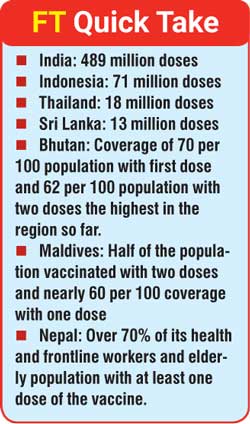Thursday Feb 19, 2026
Thursday Feb 19, 2026
Saturday, 7 August 2021 00:41 - - {{hitsCtrl.values.hits}}
 NEW DELHI: Over half a billion doses of COVID-19 vaccines have been administered in the WHO South-East Asia Region, with more vaccine doses becoming available and countries scaling up efforts to rapidly expand coverage amid recurrent surges in cases.
NEW DELHI: Over half a billion doses of COVID-19 vaccines have been administered in the WHO South-East Asia Region, with more vaccine doses becoming available and countries scaling up efforts to rapidly expand coverage amid recurrent surges in cases.
“Countries across the region are making unprecedented efforts to reach more and more people with life-saving COVID-19 vaccines demonstrating their commitment to containing the pandemic at the earliest. We must continue these and also, stringently implement public health and social measures,” said WHO South-East Asia Region Regional Director Dr. Poonam Khetrapal Singh.
COVID-19 vaccines are an important tool in our fight against the pandemic as they are effective, even against the Variants of Concern, in preventing severe disease, hospitalisation, and death.
As of 6 August, 618.5 million doses have been administered. As many as 146 million people have received two vaccine doses and are fully vaccinated.
The maximum – 489 million doses – has been administered in India, which reached 8.6 million people on day one of its reinvigorated campaign in June.
Indonesia, which was the first in the region to launch the COVID-19 vaccination drive, has administered 71 million doses, followed by 18 million doses in Thailand.
Sri Lanka has administered 13 million doses and has been consistently reaching out to 500,000 people per day with the COVID-19 vaccination, recently.
Bangladesh is scaling up vaccination and also preparing to vaccinate Rohingya refugees in Cox’s Bazar.
Bhutan has achieved a coverage of 70 per 100 population with the first dose and 62 per 100 population with two doses of the COVID-19 vaccine, the highest in the region so far.
Maldives has vaccinated half its population with two doses and nearly 60 per 100 coverage with one dose of the COVID-19 vaccine.
Nepal has vaccinated more than 70% of its health and frontline workers and elderly population with at least one dose of the vaccine.
Thailand has vaccinated 84% of their health workforce.
Timor-Leste has vaccinated almost a quarter of its population with one dose.
Commendable efforts are being made by countries. With more doses available in recent weeks through COVAX, all possible efforts need to be made to expand COVID-19 vaccination coverage even further, the Regional Director said adding that nearly 90% of all vaccine doses available in the region have been utilised.
Countries in the region are administering Astra Zeneca, Covaxin, Janssen, Moderna, Sinopharm, Sinovac, Sputnik V and Pfizer following emergency use authorisation being granted by their national regulatory authorities.
“Countries in the region are striving to achieve WHO’s goal of having 10% of the population fully vaccinated by September-end, 40% by the end of this year and 70% by mid-2022,” the Regional Director said, adding that it is heartening to see the push for vaccination at a time when countries are also battling a surge in cases.
This is also the time to closely evaluate vaccination coverage data to see who is being left out, where and why. Some people may still not be aware of the benefits of the COVID-19 vaccination, some may not be convinced, and some may have concerns. There could also be issues of accessibility, she said.
“We need a tailored communication approach, just as we do for childhood immunisation, and work closely with communities for uptake of vaccines and successful implementation of public health and social measures,” said Dr. Khetrapal Singh.
Vaccines are lifesaving but on their own, they are not enough. Implementation of public health and social measures are equally important, she emphasised.
“Even after taking both doses of the COVID-19 vaccine, people must continue to wear masks, wash hands, maintain distance, avoid crowded areas, etc. We need to ‘do it all’, especially when most people are not vaccinated and COVID-19 is widespread. This is the only way to curtail transmission of the virus that continues to overwhelm our health systems and impact lives and livelihoods,” the Regional Director said.